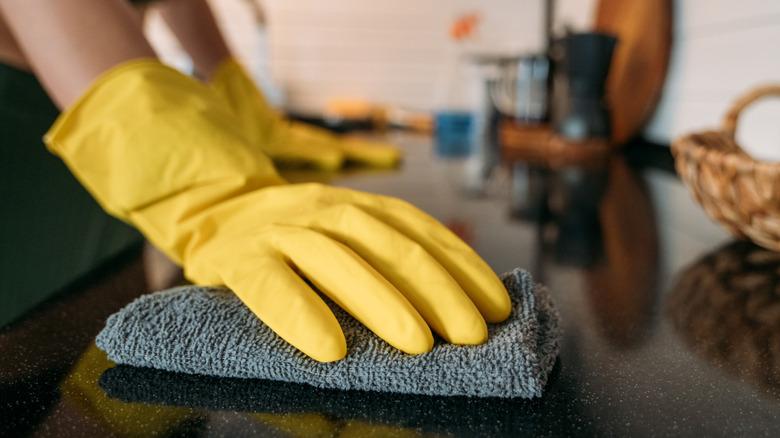Laminate Countertop Cleaning Rules You Should Never Break
You probably first chose laminate countertops due to the lower cost compared to granite, but once you get to know laminate well enough, it makes for a surprisingly durable — and beautiful — material. That said, there are certain ways that laminate is more susceptible to damage than other countertop materials, and some key rules you have to pay attention to when you spray and wipe it down. But there's good news as well: For the most part, when it comes to cleaning laminate countertops, less is more.
Hunker spoke exclusively with Kathy Cohoon, Operations Manager at Two Maids, about the mistakes people often make when cleaning laminate counters — and sure enough, she said that these turn out to be mistakes that are often easy to avoid. The first, and perhaps most obvious rule, is to avoid cleaning with overly abrasive cleaners and other supplies. "All that's needed to clean laminate is gentle dish soap, a small amount of water and a microfiber cloth," Cohoon said. "Avoid steel wool or scouring pads."
The second rule? Per Cohoon, "Avoid harsh cleansers."
Don't get aggressive with your materials or cleansers on laminate countertops
The second rule, closely related to the first, is to avoid harsh cleaners that can damage your countertop's finish. Bleach, it turns out, is a big no-no for laminate counters, according to Two Maids Operations Manager Kathy Cohoon. "Using such a strong cleaning agent can damage the finish. You may be tempted to use bleach on a tricky stain, but treating stains with a warm water and baking soda paste can do the job."
For everyday cleaning, laminate countertops are even less demanding than their competitors, and mistakes happen when people overdo their cleaning process rather than taking it easy. Always follow your countertop manufacturer's directions, of course, but in general there need be nothing aggressive about your supplies. As Choon elaborated, "The most important rule for laminate countertops is don't let stains set in and sit for too long because they are harder to remove and wipe up spills as they occur."
Laminate isn't as waterproof as you may think
At a glance, laminate countertops appear to be practically impervious to water. Water typically beads up on the finished surface, or rolls off easily. Surprisingly, that's where the trouble begins. When Hunker spoke exclusively with Two Maids' Kathy Cohoon about caring for laminates, she explained why. "Laminate is not porous, whereas other materials like granite and marble are. Because of that, you might think laminate is safe from spills or water sitting on the countertop too long. But actually, moisture can leak into the edges or seams of laminate and cause peeling."
Do note that seamless laminate countertops are probably a bit less prone to water infiltration. Nonetheless, heed this advice. Because using too much water can sneak under the outer layer of material, take care unless the laminate countertop has been completely sealed. And the troubles with too much water don't end with peeling, as water seepage can also stain and damage the visible finish.
"Avoid using too much water when cleaning any countertop surface and wipe up spills quickly," Cohoon said. Simplicity itself.


